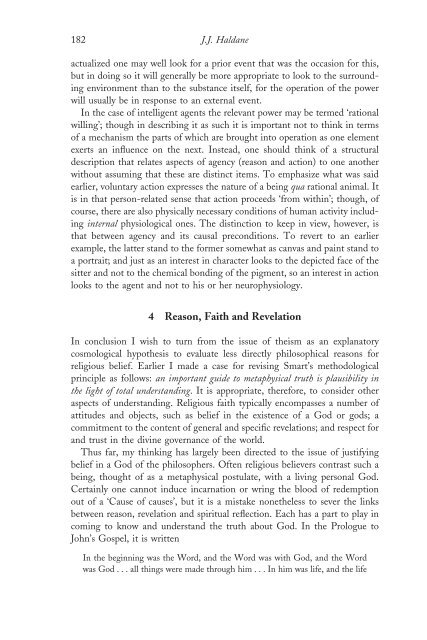Atheism and Theism JJ Haldane - Common Sense Atheism
Atheism and Theism JJ Haldane - Common Sense Atheism
Atheism and Theism JJ Haldane - Common Sense Atheism
Create successful ePaper yourself
Turn your PDF publications into a flip-book with our unique Google optimized e-Paper software.
182 J.J. <strong>Haldane</strong><br />
actualized one may well look for a prior event that was the occasion for this,<br />
but in doing so it will generally be more appropriate to look to the surrounding<br />
environment than to the substance itself, for the operation of the power<br />
will usually be in response to an external event.<br />
In the case of intelligent agents the relevant power may be termed ‘rational<br />
willing’; though in describing it as such it is important not to think in terms<br />
of a mechanism the parts of which are brought into operation as one element<br />
exerts an influence on the next. Instead, one should think of a structural<br />
description that relates aspects of agency (reason <strong>and</strong> action) to one another<br />
without assuming that these are distinct items. To emphasize what was said<br />
earlier, voluntary action expresses the nature of a being qua rational animal. It<br />
is in that person-related sense that action proceeds ‘from within’; though, of<br />
course, there are also physically necessary conditions of human activity including<br />
internal physiological ones. The distinction to keep in view, however, is<br />
that between agency <strong>and</strong> its causal preconditions. To revert to an earlier<br />
example, the latter st<strong>and</strong> to the former somewhat as canvas <strong>and</strong> paint st<strong>and</strong> to<br />
a portrait; <strong>and</strong> just as an interest in character looks to the depicted face of the<br />
sitter <strong>and</strong> not to the chemical bonding of the pigment, so an interest in action<br />
looks to the agent <strong>and</strong> not to his or her neurophysiology.<br />
4 Reason, Faith <strong>and</strong> Revelation<br />
In conclusion I wish to turn from the issue of theism as an explanatory<br />
cosmological hypothesis to evaluate less directly philosophical reasons for<br />
religious belief. Earlier I made a case for revising Smart’s methodological<br />
principle as follows: an important guide to metaphysical truth is plausibility in<br />
the light of total underst<strong>and</strong>ing. It is appropriate, therefore, to consider other<br />
aspects of underst<strong>and</strong>ing. Religious faith typically encompasses a number of<br />
attitudes <strong>and</strong> objects, such as belief in the existence of a God or gods; a<br />
commitment to the content of general <strong>and</strong> specific revelations; <strong>and</strong> respect for<br />
<strong>and</strong> trust in the divine governance of the world.<br />
Thus far, my thinking has largely been directed to the issue of justifying<br />
belief in a God of the philosophers. Often religious believers contrast such a<br />
being, thought of as a metaphysical postulate, with a living personal God.<br />
Certainly one cannot induce incarnation or wring the blood of redemption<br />
out of a ‘Cause of causes’, but it is a mistake nonetheless to sever the links<br />
between reason, revelation <strong>and</strong> spiritual reflection. Each has a part to play in<br />
coming to know <strong>and</strong> underst<strong>and</strong> the truth about God. In the Prologue to<br />
John’s Gospel, it is written<br />
In the beginning was the Word, <strong>and</strong> the Word was with God, <strong>and</strong> the Word<br />
was God . . . all things were made through him . . . In him was life, <strong>and</strong> the life

















